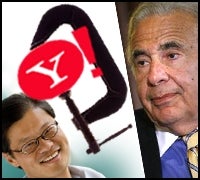 |
As it girds for war with billionaire investor Carl Icahn, Yahoo (NASDAQ: YHOO) has made public a detailed explanation of the controversial severance plan that has become a flash point in the fight over company control.
In an SEC filing last night, Yahoo provided a long list of frequently asked questions about the severance packages taken from the company’s intranet.
The filing reads as a public defense of the provision, reiterating and elaborating on Yahoo’s chief talking point that it was necessary during a “period of uncertainty” for the company.
Enacted in February as Yahoo fortified its position against Microsoft’s bid to acquire the company, the severance packages provide for up to two years’ salary for employees who are fired or leave for “good reason” in the event of a change in control of the company. Icahn has blasted the measure as a “poison pill,” claiming that it could cost any purchaser more than $2.4 billion.
Icahn has assembled a rival slate of directors whom he seeks to get elected at Yahoo’s shareholder meeting Aug. 1 in an attempt to engineer a sale to Microsoft.
Icahn and others have accused Yahoo of enacting the severance packages as an attempt to thwart Microsoft’s acquisition bid, a charge that Yahoo denied in its filing.
The tycoon has repeatedly called on Yahoo’s board to drop the severance clause. Yahoo said it cannot do that because of language stating that the severance packages remain in effect while there is an ongoing public effort to gain control of the company, such as the one Icahn is currently engaged in.
In the company intranet post, Yahoo took issue with the $2.4 billion figure, claiming that Icahn took it out of context from a litigation filed by one of the shareholder groups upset with the response to Microsoft’s offer.
That figure assumes the departure of all of Yahoo’s employees under conditions that would trigger the severance packages, Yahoo said.
Yahoo also rejected Icahn’s characterization of the program as a “poison pill,” citing the more common use of that term for a scheme to drive up the acquisition cost by enticing shareholders to purchase large quantities of stock at a discount.
Employees who leave within two years following a change in control of the company would be eligible for the severance packages, but the conditions that trigger the provision are murky. Employees who leave voluntarily for “good reason” are eligible, which Yahoo describes as including any “substantial adverse alteration in the employee’s duties or responsibilities,” which could be broadly applied in the event of a sweeping reorganization that would result from a merger.
The provision is written into Yahoo’s bylaws so that an incoming board would not be able to repeal the severance packages until two years after taking control of the company.
This latest from Yahoo follows another flurry of activity this week as the August showdown with Icahn looms. Yahoo sent out its definitive proxy statement on Monday, again urging shareholders to cast their votes for the incumbent directors.
“Mr. Icahn has no credible plan except to sell the company to Microsoft — despite the fact that Microsoft has publicly indicated that it has no current interest in such a transaction,” Yahoo said.
Chairman Roy Bostock and CEO Jerry Yang highlighted some encouraging signs from the company, including a recent string of ad deals and the forthcoming AMP ad platform.
Icahn came out with his own missive on Monday, publicly lambasting Bostock for the third time in a week about the severance plan. Icahn also took issue with Bostock’s compensation at a time when the company was struggling to revive its stock price:
“Indeed, you made approximately $10,000 per week last year — not bad for a board member. I believe most of your shareholders would be interested in seeing your time sheets — especially in light of the fact that, in my estimation, most of your so-called ‘plans’ over the last few years have been failures.” Yang took a salary of $1 last year.
Icahn then restated the promise he had made earlier to replace Yang with a chief executive cut from the mold of Google’s Eric Schmidt, a “great operator as a CEO who helped to transform the company into a giant at the expense of Yahoo.”
For two years, Google’s operating income soared while Yahoo’s fell, Icahn said, demanding to know what the board’s plan was during this time, and why it failed. “Why did you permit Google to leave you in the dust?”
As the posturing continues in advance of the August shareholders’ meeting, Yahoo might face a more immediate challenge. Lawyers for two pension funds that have filed suit against Yahoo’s board over its response to Microsoft’s offer have asked the judge for a trial ahead of the August shareholders’ meeting.
“A July trial on the validity of the severance plans is imperative for Yahoo shareholders,” attorneys for the plaintiffs wrote. Since Yahoo structured the severance packages so that they could not be rescinded amid an ongoing effort to gain control of the company, “only the court can invalidate the severance plans,” they wrote.


